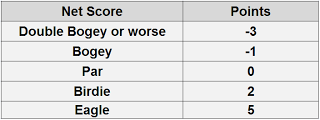************* Let’s face it; we have all choked. In fact, just last week, I played a round of golf with my dad and everything was absolutely perfect: the sun was shining, the course was immaculate and the golf on display was absolutely superb (even if I do say so myself). As a 15 handicapper, it is not often that you get these types of rounds, so you have to make the most of them! Luckily, for 15 holes, I did just that and raced into a four-shot lead with three holes to play. Surely my dad couldn’t overtake me now?
WRONG! I lost by one stroke… I was (and still am) absolutely gutted. The story of choking in golf, however, isn’t unique to me. Who could forget Adam Scott at the 2012 Open?
 Could you imagine the pain and heartache that Adam Scott experienced that day? Many
predicted that he would never get over it; he did, however, and in spectacular
style by winning the 2013 Masters.
Could you imagine the pain and heartache that Adam Scott experienced that day? Many
predicted that he would never get over it; he did, however, and in spectacular
style by winning the 2013 Masters. Adam Scott went on to win the 2013 Barclays and with a final bogey-free round. Still, Adam Scott believed his final round wasn't good enough to win. Caddy Steve Williams was seen packing Scott's golf bag with the Aussie player thinking that he "really didn't think I had much of a chance." The reason behind Adam Scott's win at The Masters was undoubtedly the change in his psychology. He didn’t play flawless golf at Augusta, but he got the job done. The same can be said for this year’s US Open Champion Justin Rose who has also had his demons. After coming in fourth at the Open at the age of just fifteen, Rose went on to miss twenty-one consecutive cuts! Since then, however, Rose has rebounded and can now also call himself a major champion; something that fellow Brits Lee Westwood and Luke Donald can only dream of. Although our golfing exploits are nowhere near on par with those of our idols, we can take similar steps to avoid choking in a similar fashion. 1. Accept your handicap: Your handicap exists for a reason and your aim is to reduce it. We cannot expect to be perfect every time we play golf. We can, however, accept the situation and deal with it accordingly. The key is getting into a positive mindset.
 Often, there is no need to go ‘birdie
searching’ when a par will do. Try adopting the stableford scoring system as this will give you an accurate reflection of your round-
you could be doing a lot better than you think!
2. Play the hole, not the situation:
If you’re having a good round, focus on
the positives and play the shots you’re capable of achieving. If you start trying to
lay-up or play shots that you haven’t been playing during the round, you
increase the risk of ‘choking’.
Often, there is no need to go ‘birdie
searching’ when a par will do. Try adopting the stableford scoring system as this will give you an accurate reflection of your round-
you could be doing a lot better than you think!
2. Play the hole, not the situation:
If you’re having a good round, focus on
the positives and play the shots you’re capable of achieving. If you start trying to
lay-up or play shots that you haven’t been playing during the round, you
increase the risk of ‘choking’. Always play your natural game despite what
those around you may be saying!
3. Dress for success:
In order to play well you have to look, and feel, the
part. Although some courses do not enforce a dress code, it is still important
that you maintain proper golf etiquette. Dressing in golf attire regardless will help get you into the
right mindset and will ensure that you ‘feel the part’. Yes, golf etiquette does mean that what you wear is a reflection on you.
Contrary to popular belief, golf clothing
is also less expensive than you’d imagine. Try checking out My Golf Locker to see what’s on offer.
Join the conversation on Twitter @Golf4Beginners and friend me on Facebook.
Always play your natural game despite what
those around you may be saying!
3. Dress for success:
In order to play well you have to look, and feel, the
part. Although some courses do not enforce a dress code, it is still important
that you maintain proper golf etiquette. Dressing in golf attire regardless will help get you into the
right mindset and will ensure that you ‘feel the part’. Yes, golf etiquette does mean that what you wear is a reflection on you.
Contrary to popular belief, golf clothing
is also less expensive than you’d imagine. Try checking out My Golf Locker to see what’s on offer.
Join the conversation on Twitter @Golf4Beginners and friend me on Facebook.photo credit: ESPN, Brentgolf.com
Disclosure: This is a “sponsored post.” The company who sponsored it compensated me via a cash payment, gift, or something else of value to write it. Regardless, I only recommend products or services I use personally and believe will be good for my readers. I am disclosing this in accordance with the Federal Trade Commission’s 16 CFR, Part 255: “Guides Concerning the Use of Endorsements and Testimonials in Advertising.

